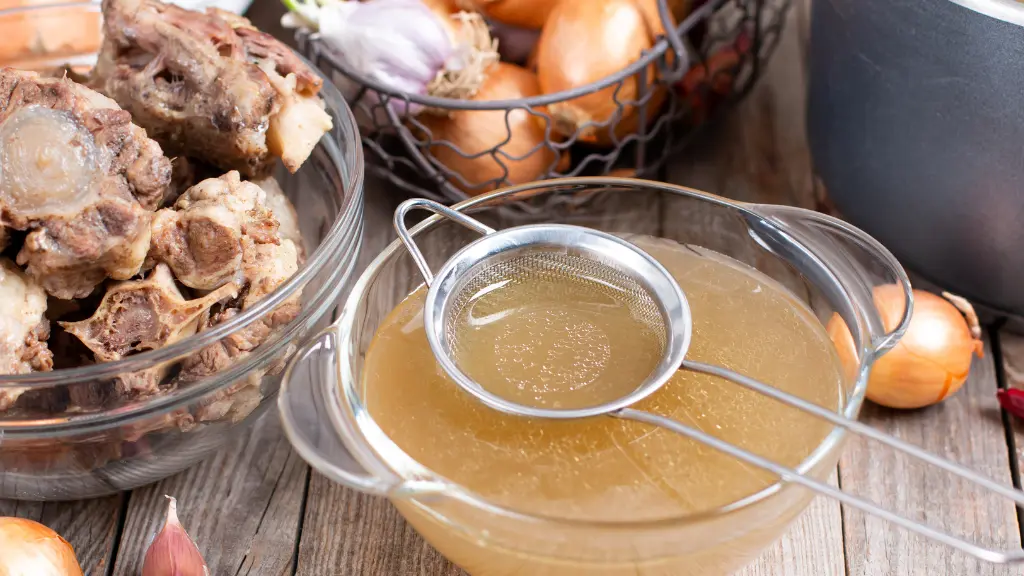Bone broth has quickly become a health sensation, often hailed as a natural powerhouse of nutrients. From being touted for its high collagen content to its potential benefits for joint health, digestion, and more, bone broth has moved from culinary staple to wellness essential in recent years. So, is this simple, ancient recipe truly as beneficial as it’s made out to be, or is it just another health trend?
Here’s an in-depth look at bone broth’s potential benefits, its nutrient profile, and tips for adding it to your diet.
You May Also Like: Is Dyeing Your Hair Bad for Your Health? Exploring the Myths and Facts
What Is Bone Broth?
Bone broth is a nutrient-rich liquid made by simmering animal bones, usually with cartilage, connective tissues, and sometimes vegetables, herbs, and spices for a prolonged period—typically 12–24 hours. This slow-cooking process helps extract essential minerals, amino acids, collagen, gelatin, and other nutrients from the bones and connective tissues, resulting in a broth with a unique nutrient profile.
The Nutritional Value of Bone Broth
Bone broth contains a variety of nutrients that can vary depending on the bones and cooking process. Here are some key nutrients:
- Collagen and Gelatin: Collagen is a type of protein that provides structure to the skin, joints, and connective tissue. When collagen is cooked, it becomes gelatin, a protein that supports gut health and digestion.
- Amino Acids: Bone broth contains amino acids like glycine, proline, and glutamine, which are essential for bodily functions including protein synthesis, cellular repair, and immune system support.
- Minerals: The broth contains trace minerals such as calcium, magnesium, potassium, and phosphorus, which are essential for bone health, muscle function, and metabolic processes.
Top Health Benefits of Bone Broth
- Supports Joint HealthThe collagen and gelatin content in bone broth may offer benefits for joint health. Collagen is a key component of cartilage, which cushions the joints and helps in maintaining their smooth function. Studies have shown that consuming collagen-rich foods may help reduce joint pain in athletes and individuals with arthritis.
- Promotes Digestive HealthGelatin, a protein derived from collagen, is known to support gut health by aiding in the maintenance of the intestinal lining. This can be especially beneficial for people with conditions like leaky gut syndrome or irritable bowel syndrome (IBS). The amino acid glutamine found in bone broth also plays a role in protecting the intestinal barrier, promoting better digestion.
- Boosts Skin Health and ElasticityCollagen is crucial for skin elasticity, firmness, and hydration, which often decrease as we age. Drinking bone broth can provide the body with collagen, which may help reduce wrinkles and increase skin moisture. Although research on direct skin benefits is ongoing, many people report improvements in skin health with consistent collagen intake.
- Strengthens Immune SystemBone broth’s amino acids, particularly glycine, proline, and arginine, have anti-inflammatory and immune-supporting properties. These amino acids may help the body to fight infections and inflammation, contributing to overall wellness.
- Assists with Weight ManagementBone broth is a low-calorie, nutrient-dense food that can help satisfy hunger and prevent overeating. The high protein content in bone broth can also promote feelings of fullness, helping to control appetite and reduce calorie intake throughout the day.
Does Science Support the Benefits of Bone Broth?
While many health experts and enthusiasts claim the benefits of bone broth, scientific research is still catching up. For example, collagen and gelatin have been linked to benefits in joint and skin health, but these studies often use concentrated collagen supplements, not bone broth. However, the nutrients present in bone broth do play important roles in the body, and many people find bone broth to be a soothing, nourishing addition to their diet.
Choosing the Right Bone Broth
Not all bone broths are created equal. Here are a few things to look for when choosing a high-quality bone broth:
- Ingredients: Look for broths that use a variety of animal bones (like chicken, beef, or fish) along with vegetables and herbs for added flavor and nutrients.
- Cooking Time: Quality bone broth is slow-cooked for at least 12–24 hours. This long cooking process is key to extracting the nutrients.
- No Additives: Some commercial bone broths contain added salt, preservatives, or artificial flavors. Opt for brands that offer pure bone broth with minimal added ingredients.
- Organic or Grass-Fed: Choosing bones from organic, grass-fed animals can increase the nutrient profile and ensure fewer chemicals or antibiotics in your broth.
How to Make Bone Broth at Home
Making bone broth at home is relatively simple, though it requires a bit of time and patience. Here’s a quick recipe to get started:
- Ingredients:
- 2–3 lbs of animal bones (chicken, beef, or fish work well)
- 1–2 tbsp apple cider vinegar (helps draw out minerals from bones)
- Vegetables (like carrots, celery, and onions)
- Herbs (like thyme, rosemary, or bay leaves)
- Water to cover ingredients
- Instructions:
- Place bones in a large pot or slow cooker.
- Add vinegar and cover with water.
- Add vegetables and herbs for added flavor.
- Bring to a boil, then reduce heat and simmer for 12–24 hours.
- Strain and store in the refrigerator for up to a week or freeze for later use.
Adding Bone Broth to Your Diet
Bone broth can be sipped on its own or used as a base for soups, stews, and sauces. Here are a few creative ways to enjoy bone broth:
- Morning Brew: Drink a warm cup of bone broth with a sprinkle of salt and pepper as a morning beverage.
- Soup Base: Use bone broth as the base for your favorite soups to enhance flavor and nutrition.
- Rice or Quinoa Cooking Liquid: Replace water with bone broth when cooking grains to infuse extra nutrients and flavor.
Final Thoughts: Is Bone Broth Right for You?
Bone broth has numerous potential benefits, from improving joint health to supporting digestion and immunity. However, it’s important to remember that while bone broth can be a valuable addition to a balanced diet, it shouldn’t replace other essential nutrients. If you’re interested in adding bone broth to your diet, start with small amounts and see how it makes you feel. And as with any dietary change, consult your healthcare provider, especially if you have specific health concerns.
In the end, bone broth is a time-tested, nourishing food that many people enjoy for its comforting taste and possible health benefits. Whether you’re sipping it for your skin, joints, or simply because you enjoy it, bone broth is here to stay as a staple in health and wellness.










